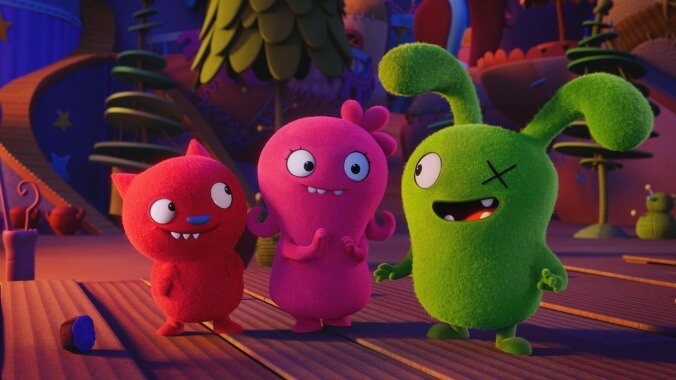It’s not necessarily a bad idea to merge the traditional “welcome to our wonderful world” song (e.g. Moana’s “Where You Are” or The Little Mermaid’s “Under The Sea”) with the classical “I want” song. Disney pulled off a clever hybrid with “When Will My Life Begin” in Tangled, which perfectly illustrates its heroine’s attempt to busy herself away from her nagging desire for more. But it soon becomes clear that UglyDolls isn’t exploring contradictions so much as making them and then shrugging. Later in the movie, a friendly non-Ugly doll named Mandy (Janelle Monáe) adds a preface to a makeover montage and accompanying song. She notes that she doesn’t think her new friends need makeovers, but if they insist, she wants to be the one in charge. This isn’t played for comic irony; it’s just a content advisory warning on the song, basically explaining that this isn’t what this movie is all about, but, well, you gotta do something to pad out the 88 minutes.
Not surprisingly, UglyDolls uses songs to stretch its straight-to-Netflix premise out to feature length. The movie employs not just Clarkson and Monáe but also Blake Shelton, Nick Jonas, Charli XCX, Lizzo, Pitbull, and Bebe Rexha to voice its characters. Regrettably, many of these professional singers barely sing in the movie; even more regrettably, Shelton sings much more than Charli XCX or Lizzo. Missing its chance at Moulin Rouge-style soundtrack eclecticism, the movie doesn’t even make it to Trolls-style eclecticism—though that DreamWorks cartoon seems to be a major influence. Like their Troll ancestors, the UglyDolls combine an evergreen cuteness with a why-now lack of currency.
None of this will matter much to the movie’s target audience, which is very, very young; that UglyDolls somehow has a PG rating should serve as proof that “G” is now officially reserved for movies about baby animals frolicking, or possibly paint drying. Moxy’s journey from UglyVille to Perfection, another land where more conventionally cute dolls are trained for their impending lives with real children in sort of a low-rent Toy Story prequel, is about as innocuous as non-VeggieTales animation gets—too innocuous to become actively irritating to the adults in the audience. The downside is that adults won’t find it very funny, either, despite Moxy traveling with no fewer than four comic-relief sidekicks who don’t particularly share her dream of ascension to child’s-plaything status. The movie seems to sense this comic void, and tries to delight the parents with occasional bits of lampshading about fudged plot details. Thrill to the sound of Wanda Sykes lightly nitpicking the movie’s timeline!
These flashes of self-awareness don’t clarify the story’s core nonsense, involving Lou (Jonas), a judgmental boy doll, attempting to stop Moxy from completing her training—though, again, that will be a nonissue to the under-five crowd. Still, their guardians should know that while UglyDolls has a sweet message of acceptance and body positivity, it also features an efficient demonstration of how voice acting is just like real acting, in that singers don’t automatically know how to do it well. (Clarkson and Shelton in particular say their lines slowly and awkwardly, as if they’re carefully reading them aloud for the first time.) The animation is pleasant enough—the faux-plush characters’ eyes have an appealing 2D-style simplicity—but often cheap-looking, and several of the songs are performed in front of vague music-video landscapes rather than the movie’s actual environments, in a seeming attempt to skimp on expensive background detail. Adults in charge might want to take a cue from the movie’s penny-pinching, and save some money on movie tickets.










































